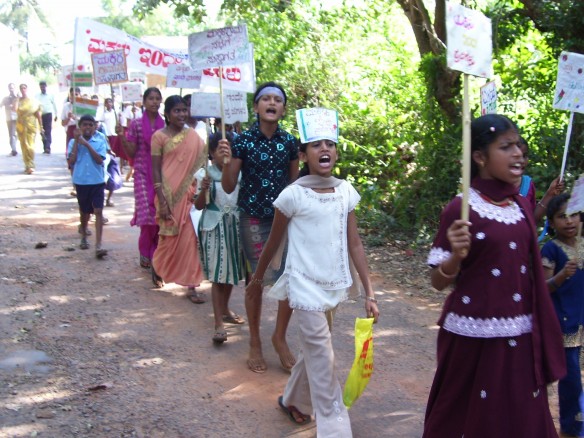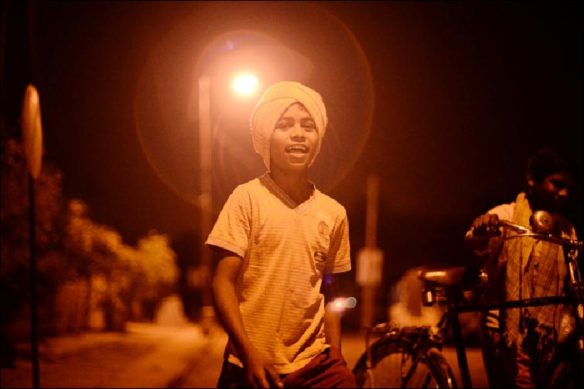Children’s citizenship
For over two decades CWC has pioneered radical new models of children’s participation in governance. The structures we have helped create in villages and urban areas across Karnataka, children’s councils and village-wide children’s meetings, have enabled children to draw attention to problems and propose solutions that would never have been achieved through adult-led governance. At the same time, these institutions of children’s governance fulfill children’s legal and moral right to participation in decisions concerning them.
Participation: the ‘third P’
“If it’s related to me, they should ask me. If it’s related to the poor children of the state, they should ask the children directly. Participation is me talking and voicing my opinion with courage.”
– Mahesh, 13 years, Bhima Sangha member
In India, just as most of the world, children are not considered as ‘citizens’. They are regarded as citizens in waiting, not fully franchised. Though they are expected to do many things responsibly – going to school, studying and performing in exams, carrying out duties at home – they have no say in determining what their city/locality/village should be like in the next twenty years or determine what needs to be done to make their (children’s) life easier.
But in fact, children have a moral and legal right to participate in governance surrounding any issues that affect them. The UN Convention on the Rights of the Child, ratified in 1990, sets out three broad categories of rights all children should enjoy: protection from threats, provision of basic services like education, and participation in decisions affecting them. Sadly, this ‘third P’ has proven the most difficult to make a reality, and has encountered much resistance.
“When we talk of children’s right to participation, we are talking about children being able to intervene in decisions that affect their lives.”
– Kavita Ratna, Director-Communications, CWC
The inclusion of children’s participation in governance strengthens democracy. Through participation, children learn the processes of democratic governance and develop skills of independent reasoning and debate. As critical observers of their own condition, children are often best placed to identify the problems they face and devise solutions. And, in our experience, we’ve found that the participation of children in governance can be a powerful catalyst for the invigoration of adult participation.
Watch ‘Citizens Today‘ a documentary film produced by CWC on children’s citizenship.
Makkala Panchayats (children’s councils)
In 1995 CWC, along with Bhima Sangha, the union of working children CWC facilitates, launched its Dhudio Makkala Toofan (‘working children’s typhoon’) Programme. Initially operating in five Panchayats (the smallest unit of Indian local governance, equivalent to a large village or several small villages) in rural Karnataka, Toofan is a comprehensive development programme aimed at creating an environment where children are not involved in any form of work that is detrimental to their development, and where all children’s rights are recognised and realised. A key aspect of the Programme is children’s participation in governance through the establishment of Makkala Panchayats (children’s councils).
Makkala Panchayats are designed as a children’s parallel to Grama Panchayats, the elected adult councils which manage day-to-day life in rural India under the ‘Panchayati Raj’ scheme of decentralised government. Elected by all the children of a Panchayat, the Makkala Panchayat monitors the work of the adult Panchayat, identifies problems facing children, works to create solutions and, and where necessary, demands action from adult representatives.
Within a few years of being set up, Makkala Panchayats proved highly effective at enabling children to organise and demand solutions to their problems. In the Panchayat of Alur village, for example, the Makkala Panchayat helped children convince adult elected representatives of the need for a high school in the village, enabling many children, especially girls, to go to school who would otherwise have dropped out. In Keradi Panchayat, members of the Makkala Panchayat convinced the Grama Panchayat to close down illegal alcohol shops in their community.
Moreover, children in areas where Makkala Panchayats exist tell us that they alter the whole attitude of adults to children. Often dismissive before, elected adult representatives are now attentive to children’s concerns. Makkala Panchayats have identified and helped resolve many issues which affect not just children but the entire communities and helped invigorate local democracy at the adult level. In 2004, for example, Makkala Panchayats were central to CWC’s work facilitating 20,000 children of the Taluk of Kundapur to participate in their village’s contributions to the national five-year planning process. State officials were so impressed with their work they recruited Makkala Panchayat members to provide training to 82,000 adult Panchayat members statewide! This is documented in detail in ‘A Unique Revolution’ published by CWC.
In 2006, CWC published a Protocol of the Makkala Panchayats, a publication designed to help Panchayats set up Makkala Panchayats. Launching the booklet, C.M. Udaasi, then State Minister of Development and Panchayat Raj, said that Makkala Panchayats were “showing the adults how to run the government in harmony.”
“Children are not only discussing and trying to solve their problems through the Makkala Panchayats, but they are also showing the adults how to run the government in harmony.”
– C.M. Udaasi, Minister, Department of Rural Government of Karnataka
Makkala Grama Sabhas (children’s village meetings)
Although decentralised government is often associated with only with Panchayats, it is Grama Sabhas – biannual meetings of all the people of a village – that form the basis of the Panchayati Raj system, making decisions over budgets and selecting the beneficiaries of benefits and services. Similarly, we have found Makkala Grama Sabhas – children’s village meetings – to be the most powerful force in children’s participation in governance.
The first Makkala Grama Sabhas were set up in 2002 in 12 Panchayats in Udupi district. The idea was revolutionary and the CWC facilitated the first Makkala Grama Sabha in the remote village of Keradi, which attracted more than 1000 children, who raised issues relating to basic facilities, personal problems, gender discrimination, disability and child labour to an audience including the adult Grama Panchayat members, government officials from the District. The event was attended by national MP Vinay Kumar Sorake, who told the crowd, “I have attended many adult Grama Sabhas. Rarely do elected government officials have such a depth and quality of to their information, about the problems or the solutions.”
“A little girl came up here and said, ‘when the river floods the footbridge it rises by this many feet, so we need a bridge that is this high and this long.’ I have attended many adult Grama Sabhas. Rarely do elected government officials have such a depth and quality of to their information, about the problems or the solutions.”
– Vinay Kumar Sorake, former Member of Parliament
Here is an indicative narrative on the success of Makkala Grama Sabhas.
From practice to policy
Makkala Grama Sabhas quickly became a key part of the governance of the Toofan Panchayats and began to spread to other Panchayats, particularly in the Taluk (sub-district) of Kundapura in Udupi district, a key area of activity for CWC. Following State-level advocacy by CWC and other groups, in 2006 the Government of Karnataka issued a circular mandating all Grama Panchayats in the state to carry out Makkala Grama Sabhas. CWC contributed to the drafting of the circular, and offered training and support to Panchayats across the state to help them comply with the mandate. By the end of the year more than 21,000 children statewide had taken part in Makkala Grama Sabhas. The order has been renewed annually since, and Makkala Grama Sabhas are becoming a central part of rural governance in Karnataka.
Like Makkala Panchayats, they have had an invigorating effect on local democracy. Villages that have instituted regular Makkala Grama Sabhas have typically seen significant increases in the number of adults attending regular Grama Sabhas. The two structures are contributing to a vision of ‘Grama Swaraj’ across the villages of Karnataka.
Watch ‘Makkala Grama Swaraj’, a Kannada documentary film produced by CWC on children’s participation in rejuvenating local governance.
Makkala Ward Sabhas (children’s ward meetings)
Decentralisation of government in India is deeper in rural areas than in cities, and subsequently, CWC’s work in children’s participation in government has been focused in rural areas. (Read more about local governance in India and CWC’s work in this area) Recently, however, CWC has begun working to develop children’s participation in governance in urban areas. In January 2012 CWC and other organisations facilitated the first-ever Children’s Ward Sabha to take place in India, in the Vigyan Nagar Ward of Bangalore.
Ward Sabhas are broadly the urban equivalents of Grama Sabhas, and similarly, a Makkala Ward Sabha fulfills a similar function to a Makkala Grama Sabha: enabling local children to identify problems and present proposals and requests to adult elected officials. Although the Ward Sabha was well attended and the elected representatives responded to children’s demands with seriousness, there emerged several challenges as well. In the urban context, the intense politicisation of the elected council is a hurdle to children’s participation. Further, children have found that they receive quicker responses from departmental officials, rather than from elected representatives. Therefore children decided to continue their advocacy with the departments, while CWC’s efforts at strengthening urban decentralisation will continue at the policy level. Read more about the Vigyan Nagar Children’s Ward Sabha in this narrative report.



